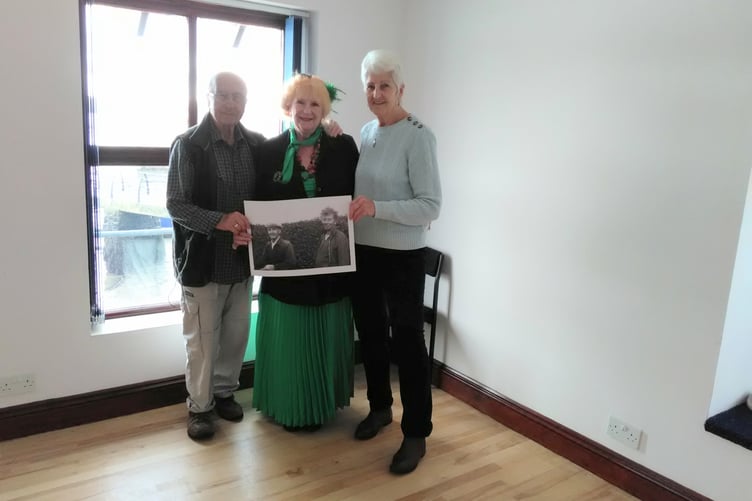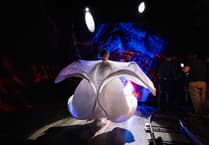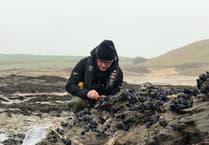by Flo Bonner
THE salty embrace of the Atlantic Ocean, the haunting echoes of gulls, and the age-old stories of fishermen set the scene for an unforgettable evening at Ashtorre Rock, Saltash, so writes Flo Bonner.
The gathering a plenty of interested people came to listen to a lecture about the extraordinary Rowena Cade – architect and creator of the Minack Theatre, situated overlooking the Atlantic Ocean at Porthcurnow, in Penzance, Cornwall – and built almost single handily by Rowena during the 1920’s and 1930’s, with extensions and updated craftsmanship of auditorium furnishings with added facilities provided up until Rowena’s death in 1983 and thereafter, to this day.
The lecture was delivered by local historian Sue Hooper and supported by her husband John; the event was organised by Lynn Marsh, Chair of Ashtorre Rock, as part of a wider programme of fundraising events in aid of the Saltash Ferry Sculptures Brass Plaques replacements.
Sue’s talk celebrated the genius and indomitable spirit of Rowena, a woman who forged a theatrical masterpiece amidst the rugged cliffs of the Minack Headland.
At the same time the lecture celebrated the invaluable contribution of Billy Rawlings, one of Rowena’s most valued gardeners and handymen at that time, the other being Charles Thomas Angove (Tom) (Billy’s brother-in-law).
Indeed, it was a bonus and a pleasant surprise for Sue that Billy’s granddaughter Maggie Gudonis happened to be in the audience.
Rowena’s story unravelled was one of unwavering determination and a narrative that mirrored the spirit of Cornwall itself; in the first instance staging the plays of Shakespeare’s ‘Midsummer Night’s Dream’ for two years, and in 1932 ‘The Tempest’, which was a very ambitious performance with a full orchestra, cast and singers.
Sue conveyed that Rowena was a woman who defied convention and dared to challenge the elements, taking on the mighty Atlantic Ocean, only losing a few small rocks and a wheelbarrow into the deep ocean 50 foot below.
The audience were captivated with Rowena’s outstanding achievements which they learned had redefined the very landscape of Penzance by creating one of the world’s most spectacular outdoor theatres, winning national and global recognition and awards, beating Shakespeare’s Globe in London and Walt Disney’s Concert Hall in Los Angeles.
The beautiful photographs that Sue produced showed the Minack perched precariously on the cliffs of Porthcurno, seemingly defying both gravity and logic, with its rugged handmade granite seats, the backdrop of the mighty Atlantic, and the wild, untamed beauty of the surroundings.
Indeed, the historic evening at Ashtorre Rock was a tribute to Rowena’s visionary spirit, which elevated the art of outdoor theatre to new heights. We couldn’t help but marvel at how Rowena managed to beat the Greeks and Romans at their own game, constructing a theatre that rivals the grandeur of ancient amphitheatres while standing in stark contrast to the majestic backdrop of the Atlantic Ocean.
It emerged that Rowena’s very happy past and privileged life living as gentry both in Derbyshire and Cheltenham, was that of a tom boy tree climber and child actress all woven together – and later, with the echoes of war horses which embraced the stories of Rowena’s first job in her late teens as part of the efforts during the Great War where in 1914 she found herself selecting and breaking in horses for their enlistment to the Western Front of France and Belgium.
Indeed, John Hooper’s reflections painted vivid pictures and the demise of the war horses that were the soldiers’ equine companions, and where he informed the audience that over one million horses from the UK were sent to the Western Front, with only 60,000 to return.
We heard how during WW2, Cornwall played a significant role as guardian of the Western Approaches, which in itself thrust Cornwall into the front line of that Global conflict.
Men and women of Cornwall were put on a war footing, beaches were sealed off with barbed wire and mines; children were evacuated to Cornwall from blitzed cities of the country; and thousands of men from Cornwall went to war, and women worked in Auxiliary Services. Rowena, the audience learned, became a local billeting officer, caring and housing hundreds of evacuated children.
Moreover, during WWII, we were informed that the Minack Theatre had to close.
However, the Minack headland and Porthcurno were used by the Gainsborough Film Company for the filming of the 1944 movie ‘Love Story’ starring Stewart Grainger and Margaret Lockwood in the leading roles – although the unit eventually had to retreat into a studio due to the shocking weather elements and storms and the threat to the unit’s starlets and valuable filming equipment.
John played to the audience the recording of the world famous ‘Love Story’ ‘Cornish Rhapsody’ famously and beautifully composed especially for the movie.
In conclusion, the gathering at Ashtorre Rock on October 18 was a celebration of Rowena Cade, the Minack Theatre, and the untamed spirit of Cornwall.
The echoes of gulls, the roar of the Atlantic, and the rich narratives of history and nature combined to create an unforgettable evening.
The audience gave an appreciative round of applause to both Sue and John, with the final word of sincere thanks given by Lynn Marsh, chairman of Ashtorre Rock.
The Minack Theatre, with its audacious location and captivating performances, remains a marvel that defies time and expectations, a jewel in Cornwall’s crown. Rowena’s legacy, along with the dedication of her two gardeners and handymen Billy Rawlings and Tom Angove, reminds us that the arts can thrive, even in the most rugged and unyielding of landscapes.
Today, the Minack Theatre continues to be a thriving cultural institution.
It is managed by a Charitable Trust, preserving Rowena’s legacy and her commitment to the arts.
The theatre’s year-long programming showcases a diverse range of productions, making it an outstanding destination for theatre enthusiasts and tourists alike.





Comments
This article has no comments yet. Be the first to leave a comment.